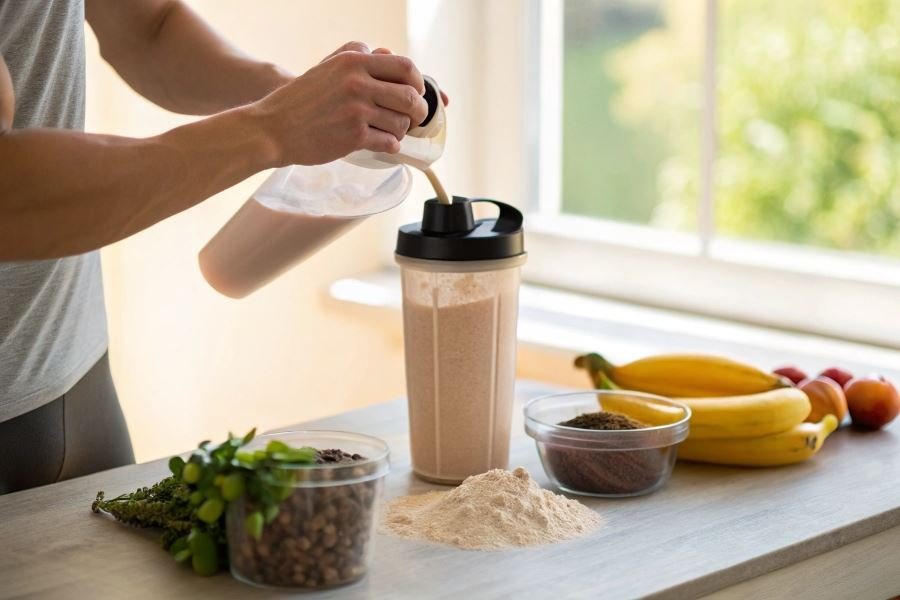
Your muscles don’t check your bank account before they grow.
That moment after an intense workout—muscles quivering, sweat cooling on your skin—is when the real magic of fitness happens. But contrary to what $50 tubs of protein powder want you to believe, effective recovery doesn’t require emptying your wallet.
The science is refreshingly democratic: your body needs specific nutrients after exercise, not fancy packaging. When you train, you create microscopic tears in muscle fibers that, when repaired, build stronger tissue. This process, called muscle protein synthesis (MPS), requires protein, carbohydrates, and proper hydration—ingredients available at every price point.
“The recovery window isn’t about premium products; it’s about timing and composition.”
Research from the Journal of the International Society of Sports Nutrition shows that 20-25g of quality protein consumed within 45 minutes post-workout optimizes recovery—whether that protein comes from a budget-friendly carton of eggs or an expensive shake. Similarly, simple carbohydrates replenish glycogen stores effectively regardless of whether they’re from a banana or a specialized recovery formula.
What truly matters is consistency and nutrient timing. Your muscles respond to amino acids and glucose, not to marketing claims or trendy ingredients. The most effective post-workout nutrition strategy is one you can maintain long-term—making budget-friendly options not just acceptable alternatives, but often the smarter choice for sustainable fitness progress.
Fuel Your Recovery Without Breaking the Bank
Protein Powerhouses Under $2
Finding affordable post-workout nutrition doesn’t mean sacrificing quality. The market is flooded with expensive recovery options, but the most effective budget post-workout complexes with maximum effectiveness often come from your local grocery store. Smart combinations of everyday foods can deliver professional-grade results without the premium price tag.
A simple can of tuna mixed with half a cup of cottage cheese delivers approximately 40g of complete protein for around $1.75 per serving. This powerhouse combination provides both fast-absorbing whey protein from the cottage cheese and slower-digesting proteins from the tuna, creating an extended release effect that supports muscle recovery for hours.
Eggs and oatmeal create another sub-$2 recovery marvel. Three eggs scrambled with half a cup of oats provides roughly 25g of protein plus complex carbohydrates that replenish glycogen stores. Add a banana for potassium (crucial for preventing muscle cramps) and you’re still under the $2 threshold while hitting all major recovery needs.
Greek yogurt paired with a scoop of peanut butter rounds out our top three protein combinations at approximately $1.90 per serving. This delivers 20-25g of protein alongside healthy fats that help reduce inflammation – a critical but often overlooked component of effective recovery.
Strategic Supplement Stacks
When whole foods aren’t convenient, strategic supplement combinations offer exceptional value.
| Supplement Combo | Protein | Cost | Key Benefits |
|---|---|---|---|
| Whey + Creatine | 25g | $1.85 | Muscle synthesis + ATP production |
| BCAA + Dextrose | 7g | $1.60 | Amino acid delivery + glycogen replenishment |
| Pea Protein + Turmeric | 24g | $1.95 | Plant-based recovery + inflammation control |
The whey and creatine combination remains undefeated for pure recovery efficiency. Purchasing these supplements in bulk from retailers like MyProtein or Bulk Supplements can bring your per-serving cost below $1.85. The science is clear: 5g of creatine monohydrate daily enhances cellular hydration and power output, while whey provides the essential amino acids needed for tissue repair.
For those sensitive to dairy, combining pea protein with turmeric creates an anti-inflammatory recovery complex that rivals more expensive options. The curcumin in turmeric enhances nutrient absorption while fighting exercise-induced inflammation.
Kitchen Recovery Masterpieces
The sweet potato scramble transforms kitchen staples into recovery gold. Dice one medium sweet potato, microwave until soft, then mix with two eggs and a handful of spinach. This delivers complex carbs, complete protein, and micronutrients for approximately $1.70 per serving.
Overnight recovery oats require minimal effort for maximum results. Combine half a cup of oats with milk, a scoop of protein powder, and frozen berries before bed. By morning, you’ll have a perfectly calibrated recovery meal waiting in your refrigerator.
The humble bean and rice bowl might be the most underrated recovery meal in existence. One cup of rice with half a cup of black beans provides the perfect carbohydrate-to-protein ratio for glycogen replenishment while delivering fiber that improves nutrient absorption. Add hot sauce for capsaicin’s anti-inflammatory benefits and you’ve created a recovery powerhouse for under $1.50.
These budget-friendly approaches prove that effective post-workout nutrition doesn’t require expensive supplements or specialty foods – just strategic combinations of everyday ingredients that deliver precisely what your body needs when it needs it most.
Maximizing Results on a Budget: Post-Workout Nutrition Mastery
The window after your workout isn’t just important—it’s golden. Your body craves specific nutrients to recover, and timing this nutrition precisely can dramatically improve your results without emptying your wallet. Let’s dive into how you can implement budget-friendly post-workout nutrition strategies that deliver maximum effectiveness.
The Perfect Timing Window
Your muscles are like sponges after training—most receptive to nutrients within 30-45 minutes after exercise. This “anabolic window” isn’t just fitness mythology; it’s backed by science. During this period, your body:
- Replenishes glycogen stores 3x faster
- Increases protein synthesis by up to 50%
- Reduces muscle breakdown significantly
The first 30 minutes post-workout is when your body processes carbohydrates and protein most efficiently—don’t waste this metabolic opportunity!
For endurance athletes, consuming carbs within 15 minutes post-exercise can increase glycogen synthesis by up to 40% compared to waiting two hours. Strength trainers benefit from protein intake within 45 minutes, which can enhance recovery by nearly 25% compared to delayed consumption.
Budget-Friendly Meal Prep Strategies
Effective post-workout nutrition doesn’t require expensive supplements. Strategic meal prep can deliver optimal nutrients at a fraction of the cost:
Batch cooking protein sources:
- Cook 3-5 pounds of chicken breast on Sunday ($2.99/lb)
- Hard-boil a dozen eggs ($3/dozen)
- Prepare a large batch of lentils or beans ($1.50/lb dry)
Quick-access carbohydrate options:
- Pre-portion rice in containers (about $0.20 per serving)
- Slice sweet potatoes for quick microwaving ($1.29/lb)
- Freeze bananas for smoothies ($0.59/lb)
Training-Specific Nutrition Adjustments
Your post-workout nutrition should reflect your training intensity and goals:
| Training Type | Carb:Protein Ratio | Budget-Friendly Options | Approximate Cost |
|---|---|---|---|
| High-intensity | 3:1 | Banana + 1 cup milk | $0.89 |
| Strength training | 2:1 | 2 eggs + toast | $0.75 |
| Endurance | 4:1 | Oatmeal + honey + whey | $1.20 |
| Recovery day | 1:1 | Greek yogurt + berries | $1.50 |
For high-intensity interval training, your glycogen depletion is significant—aim for 0.5-0.7g of carbs per pound of bodyweight. After strength training, prioritize protein at 0.25-0.3g per pound of bodyweight to maximize muscle protein synthesis.
Liquid Nutrition for Rapid Absorption
When immediate absorption is crucial, liquid nutrition delivers nutrients faster than solid foods:
- Homemade protein shakes cost about 0.75−1.25 per serving versus $3-4 for commercial options
- Chocolate milk provides the ideal 3:1 carb-to-protein ratio at about $0.50 per serving
- Tart cherry juice can reduce inflammation and costs approximately $0.75 per serving when bought in concentrate form
The difference in absorption rates is substantial—liquids can deliver amino acids to muscles in as little as 15 minutes, while solid foods might take 1-2 hours.
By strategically timing your nutrition, preparing cost-effective meals in advance, and adjusting your approach based on your specific training demands, you can maximize your results without maximizing your spending. The most effective post-workout nutrition plan isn’t necessarily the most expensive—it’s the one you consistently implement.
